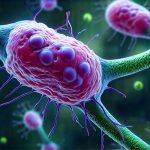Irritable Bowel Syndrome (IBS) is a chronic gastrointestinal disorder affecting millions worldwide, characterized by abdominal pain, bloating, gas, and altered bowel habits. While often dismissed as “just stress,” the underlying mechanisms are increasingly understood to be far more complex, involving intricate interactions between the brain, gut, and its vast microbial ecosystem – the gut microbiota. This isn’t a one-size-fits-all condition; IBS manifests differently in individuals, primarily categorized into subtypes based on predominant stool consistency: IBS with diarrhea (IBS-D), IBS with constipation (IBS-C), and IBS mixed type (IBS-M). Understanding the specific role of the gut microbiota in each subtype is crucial for developing targeted therapies and improving patient outcomes.
The connection between the gut microbiome and IBS isn’t merely correlational; it’s demonstrably causal, although disentangling cause and effect remains an ongoing area of research. A healthy gut microbiome contributes to several essential functions – aiding digestion, synthesizing vitamins, modulating immune responses, and maintaining the integrity of the intestinal barrier. Disruptions in this delicate balance, known as dysbiosis, have been consistently observed in IBS patients, with variations depending on whether diarrhea or constipation is the primary symptom. This article will delve into these specific microbial differences, exploring how they contribute to the pathology of each subtype and potential avenues for intervention.
Gut Microbiota Composition in IBS-D vs. IBS-C
The composition of the gut microbiota differs significantly between individuals with IBS-D and IBS-C. While both subtypes exhibit dysbiosis compared to healthy controls, the specific microbial shifts vary. In IBS-D, studies often reveal a reduction in beneficial bacteria like Faecalibacterium prausnitzii, which is known for its anti-inflammatory properties and role in maintaining gut barrier function. There’s also frequently an increase in potentially pro-inflammatory bacteria such as Escherichia coli and certain strains of Clostridium difficile. This imbalance can lead to increased intestinal permeability (“leaky gut”), triggering immune activation and contributing to the characteristic diarrhea. Understanding gut inflammation is key for many IBS sufferers.
IBS-C, on the other hand, often displays a different microbial signature. Here, we see a decrease in overall microbial diversity – meaning fewer different types of bacteria are present. Bifidobacteria and Lactobacilli, commonly associated with gut health and regularity, are frequently reduced. Simultaneously, there can be an increase in bacteria that produce hydrogen sulfide (H2S), like Desulfovibrio, which has been linked to delayed colonic transit time and constipation. It’s important to note this isn’t a simple case of “good” vs. “bad” bacteria; the functional capacity of the microbiome, not just its composition, plays a vital role.
These differences aren’t absolute, and considerable overlap exists. Individual variations in diet, genetics, lifestyle, and antibiotic use all contribute to shaping the gut microbiota, making it difficult to pinpoint universal microbial markers for each subtype. However, these general trends provide valuable insights into the underlying mechanisms driving symptoms. Furthermore, research is revealing that methanogens, archaea that consume hydrogen produced by bacterial fermentation, are often more prevalent in IBS-C patients, potentially slowing down colonic transit and exacerbating constipation. Gut pain can be a significant factor for these individuals.
Microbial Metabolites & Their Role
Microbial metabolites – substances produced during the breakdown of food by gut bacteria – play a significant role in IBS symptomology. Short-chain fatty acids (SCFAs), like butyrate, propionate, and acetate, are key examples. Produced primarily through fermentation of dietary fiber, SCFAs provide energy for colonocytes (intestinal cells), strengthen the gut barrier, and possess anti-inflammatory properties. In both IBS-D and IBS-C, SCFA production can be altered due to microbial dysbiosis.
Specifically in IBS-D, reduced levels of butyrate may compromise gut barrier integrity, leading to increased permeability and inflammation. Conversely, certain metabolites produced by pro-inflammatory bacteria in IBS-D can directly stimulate visceral hypersensitivity – an amplified perception of pain in the gut. In IBS-C, alterations in SCFA production coupled with increased H2S production contribute to delayed colonic transit time. Trimethylamine N-oxide (TMAO) is another metabolite gaining attention; its elevated levels have been associated with altered gut motility and inflammation. Emotional triggers can greatly impact these processes as well.
The intricate interplay between microbial metabolites, gut barrier function, immune activation, and visceral hypersensitivity highlights the complex pathophysiology of IBS. Understanding these connections is crucial for developing targeted therapies that go beyond symptom management. For instance, dietary interventions aimed at promoting SCFA production through increased fiber intake or prebiotics (food for beneficial bacteria) may offer therapeutic benefits.
The Gut-Brain Axis in IBS Subtypes
The gut-brain axis – the bidirectional communication network between the gut and the brain – is profoundly impacted by gut microbiota composition and function. This axis involves neural, hormonal, and immunological pathways that influence both gastrointestinal motility and emotional state. In IBS, disruptions in this axis contribute to heightened visceral sensitivity, altered pain perception, and increased anxiety or depression.
In IBS-D, microbial dysbiosis can lead to increased production of pro-inflammatory cytokines, which signal the brain and exacerbate stress responses. This creates a vicious cycle where stress worsens gut symptoms, and gut symptoms increase stress levels. Specific bacteria have even been shown to directly influence neurotransmitter production, potentially affecting mood and cognitive function. Similarly, in IBS-C, altered microbial metabolism can impact serotonin levels – a key neurotransmitter involved in regulating bowel movements and mood. Menstrual cycles also play a role for some patients.
Research suggests that modulation of the gut microbiota through interventions like probiotics or dietary changes may help restore healthy gut-brain communication, reducing visceral hypersensitivity and improving psychological well-being. Techniques such as mindfulness and cognitive behavioral therapy (CBT) are also used to address the psychological component of IBS, acknowledging the crucial link between mental health and gut function. Perfectionism can exacerbate stress responses in these patients.
Dietary Interventions & Microbiome Modulation
Diet plays a pivotal role in shaping the gut microbiota and influencing IBS symptoms. While there’s no one-size-fits-all diet for IBS, certain dietary approaches can help modulate the microbiome and alleviate symptoms. For IBS-D patients, reducing fermentable carbohydrates (FODMAPs) – sugars that are poorly absorbed in the small intestine and fermented by bacteria in the colon – is often beneficial. This can reduce gas production and bloating, lessening diarrhea. However, long-term FODMAP restriction can negatively impact microbial diversity, so it’s best implemented under the guidance of a registered dietitian.
For IBS-C patients, increasing dietary fiber intake is generally recommended to promote regular bowel movements and support SCFA production. However, introducing fiber too quickly can worsen bloating; therefore, gradual increases are advised. Prebiotics – non-digestible fibers that selectively feed beneficial bacteria – can also be incorporated into the diet. Examples include onions, garlic, leeks, asparagus, and bananas. Probiotic supplements containing specific strains of Bifidobacteria and Lactobacilli may also offer benefits, although strain selection is crucial as different strains have varying effects. Diabetes can impact gut health too.
It’s important to emphasize that dietary interventions should be individualized based on a person’s tolerance and symptom presentation. Food diaries can help identify trigger foods, and working with a registered dietitian specializing in gut health can provide personalized guidance and support. Beyond specific nutrients, adopting an anti-inflammatory diet rich in whole foods, fruits, vegetables, and lean protein is generally beneficial for overall gut health.
The understanding of the link between gut microbiota and IBS continues to evolve rapidly. Future research promises to unveil more precise microbial biomarkers for each subtype, leading to personalized therapies that target the underlying causes of this debilitating condition. Trapped gas is often a symptom that can be managed with these approaches.


















